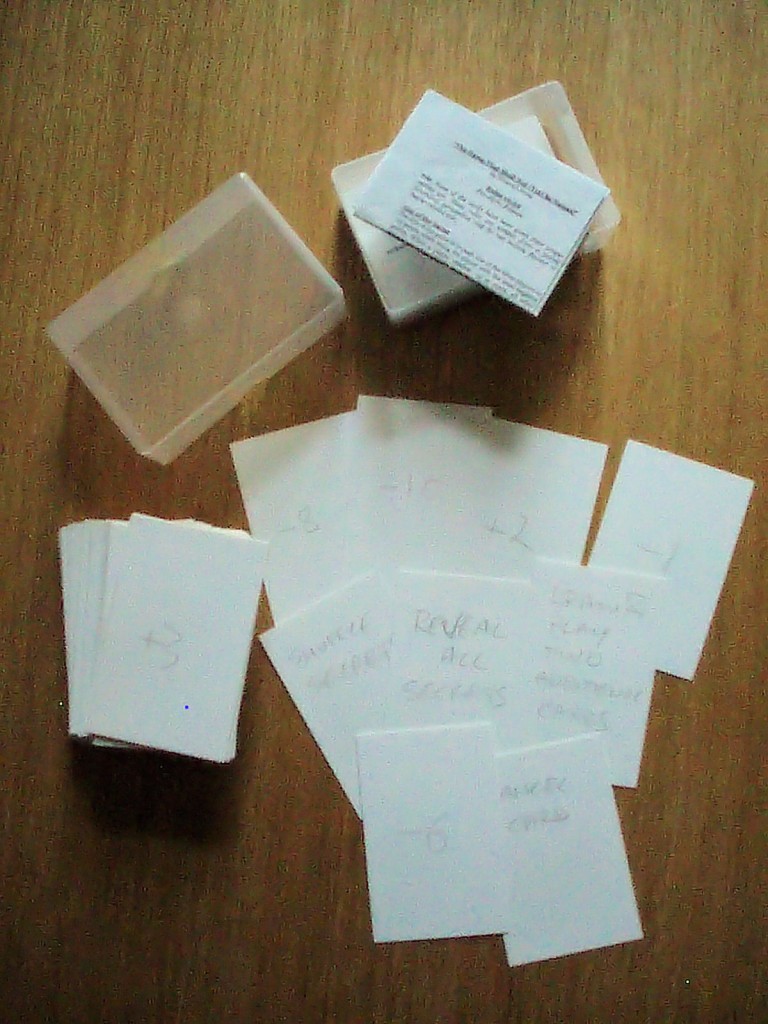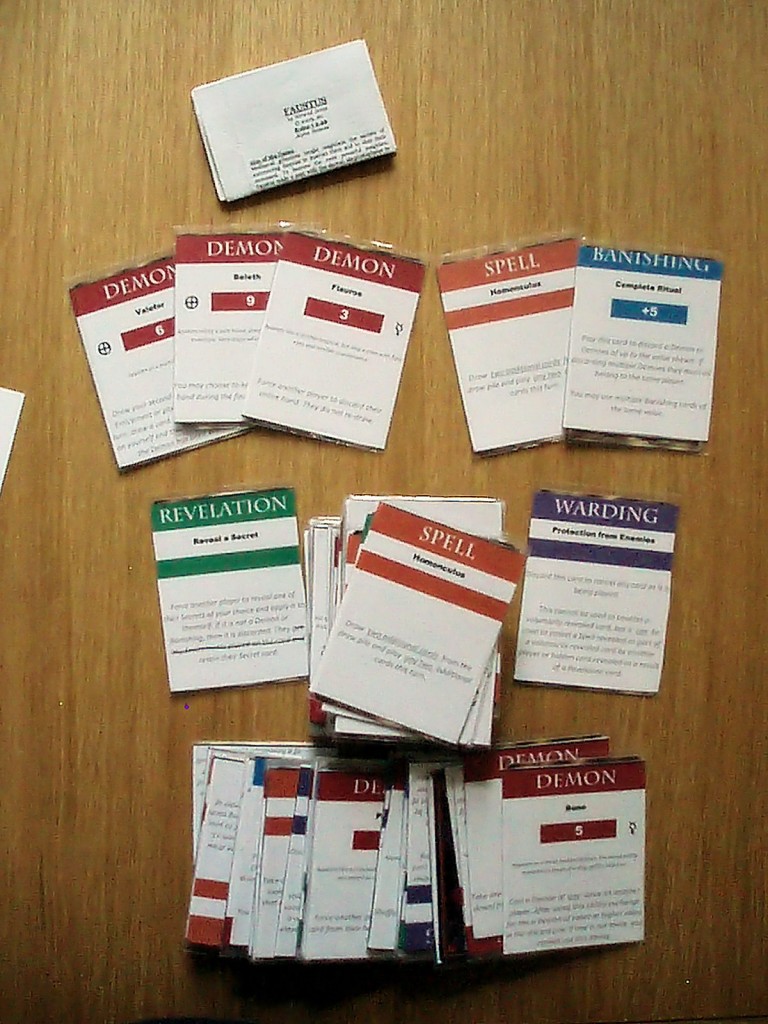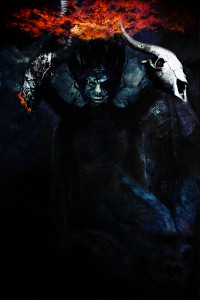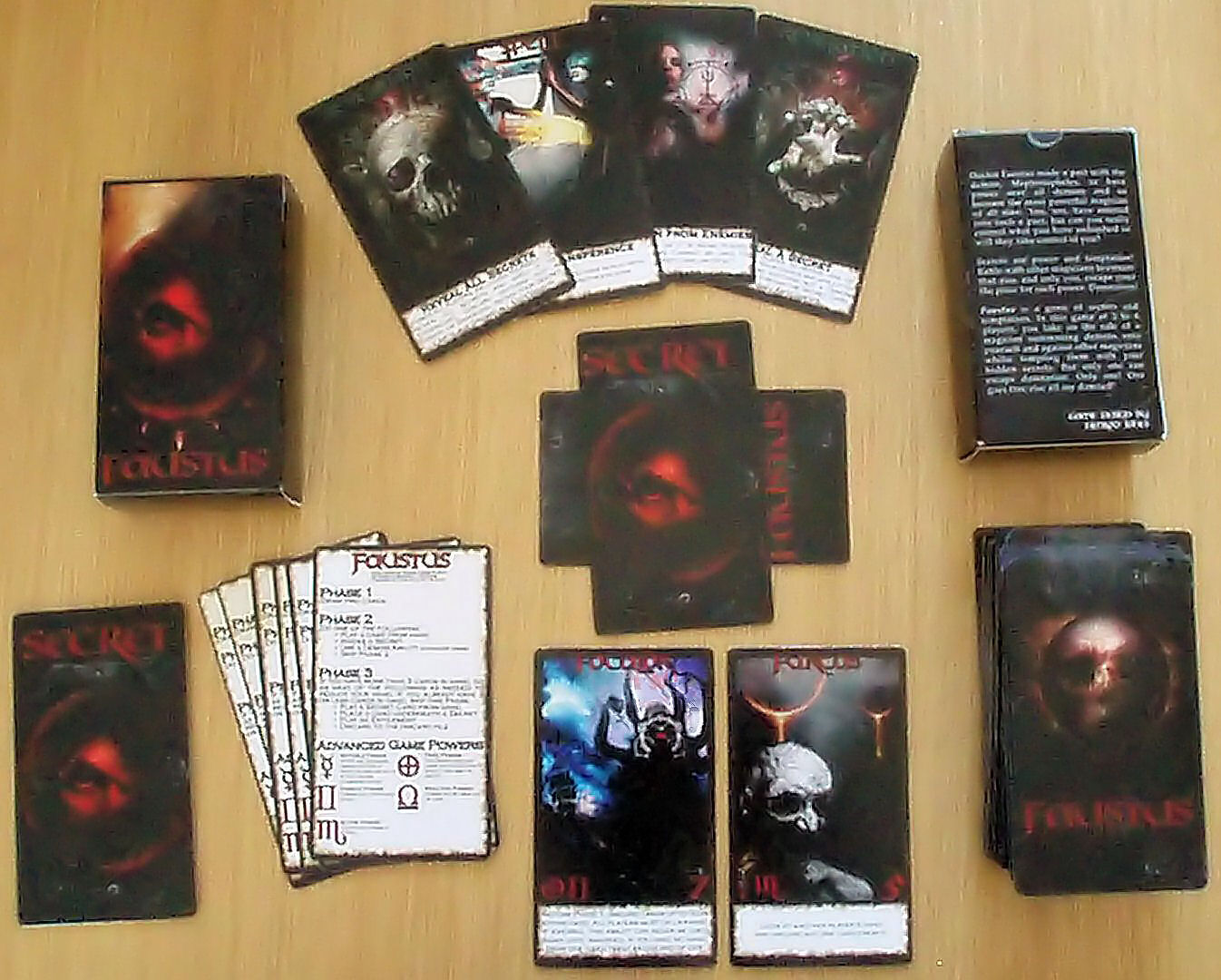Faustus was a long time in the making. The game’s creator, Nimrod Jones, talks a little about the process involved in making it from its conception through the various decks and playtesting.
It all began back in 2008 in Leicester at Continuum. Not only did I get to meet Sandy Petersen, the man behind Chaosium’s Call of Cthulhu roleplaying game, a game I particularly enjoy, but I also got to finally sit down and talk properly with Angus Abranson, co-founder of Cubicle 7. There was no business on the agenda with these meetings and I had no idea where the weekend would leave me.
With company, over drinks, I relayed a joking observation involving the Cthulhu Mythos that somehow turned into a challenge from Angus to make a card game, originally with a Cthulhu theme.
I’ve played a lot of games with fun sounding themes but rather dull mechanics. They sell on the strength of their theme or licence without much thought given to also making it a damned good game. So I set myself the challenge to focus primarily on making a game that was fun regardless of the theme.
After some deliberation on mechanics, one sleepless night (as is so often the way), I struck upon the idea of secrets (the core USP of the game) and temptation, corruption from gazing at things one should not gaze upon. As I deliberated upon how to go about manufacturing a prototype, my friend, who lived in the flat above me at the time, knocked on my door and, knowing I was devising a card game, handed me a box of business cards from his work. Perfect! In one sitting I wrote out the entire alpha deck.
It didn’t take me long to realise that this was a game with a minimum of three players. With two players, this would just be a race to see who could push the other over the top, but with at least three players, and immediately latching onto the idea that there can be only one winner else everyone loses, the challenge became much trickier.
In the alpha deck, there was no theme at all. There were positive (Banishings) and negative (Demons) numbers and the action (Spell) cards simply had written on them what they did. I presented the game to my playtesters without any preconception of theme, simply asking them to play the mechanics as presented to them. In the initial alpha plays we quickly identified a few kinks. One of the immediate ones was a card I’d put in that effectively changed the rules of the game while it was in play. Quickly deciding it was too tricky a card, this was the very first change I made and it was dropped from future playtests.
While everyone got into the spirit of the game quickly enough, after a while several playtesters identified a wariness towards looking at secrets and preferred to simply force people to look at them. As fun as the secrets were, what was lacking was motivation beyond simple table banter and innate curiosity.
I struck upon the idea of ‘enticements’, cards that would tempt people to their doom. These temptations gave the wary a motivation to take the chance and look at at the secret underneath. It was an instant winner!
I took the game to Gen Con UK and got to playtest it with a few select people including Darrell Ottery from Eclectic Games. It was received well and I was very aware that I could put several themes upon this game and it would still play well. In conversation, one of the themes I hit upon was that of magicians summoning demons. I love the story of Dr Faust, possessing Marlow’s The Tragical History of Doctor Faust and Goethe’s Faust and books exploring the Faustian legend. I knew immediately that I wanted to release the game with this theme in addition to the one I was developing.
Since I was having some difficulty thinking up card names for the Cthulhu theme of the game, it was decided that I should focus on pushing the Faust theme and dropping the Mythos for the time being.
One thing that had come from the Gen Con playtest was the idea of ‘cancel’ cards (proposed by Angus). I had deliberately not put them in, but there was a lot of positive responses to the idea, so I couldn’t not do it. I wrote them into the alpha deck and it worked very well.
The game design picked up a lot more momentum after this as I could hammer out the theme quite quickly. I knew that I wanted to get a better prototype deck going and get more people playtesting it. I took it to my local gaming club, RAWSOC, and playtested it some more until I was happy that it didn’t need any more changes to the mechanics.
When choosing the demons for the game, I did a fair bit of searching for inspiration. I wanted the game to have an authentic feel to it. I’d very much latched onto the idea of having the art in the style of mediaeval prints. As such there was only one real source of inspiration when naming the demons: the Lesser Keys of Solomon which contains 72 demons. Of course, I only needed 40, but I first had to trawl through all 72 of them, pick the ones that sounded interesting and put them into a spreadsheet according to their listed ranks, so I could work out what their values would be. Kings and Princes, of course, would have to be in the 8 – 10 value of Demons.
I co-run a games convention, OddConUK, and I decided I wanted to take a themed version of the game with me to playtest. After spending a few days creating the cards in Excel (don’t ask why I chose Excel – I’m not sure myself anymore) and working out the sizing to print that I could pop them in the cheap card protector sleeves I’d bought in bulk, I raided my old hoard of Mythos CCG cards and used them as backing. This was all the night before going to the convention (as is most of my printing for conventions) and as I was drifting off to sleep it suddenly occurred to me, “So why exactly does one want to summon demons? How does it fit into the theme?” Why of course! For the powers they grant the sorcerer: demons should have powers. Unfortunately, it was too late to redo all the demons and work out powers for them in time, but everyone who played the game agreed that they liked the idea. The Advanced Game was born!
I didn’t want to lose the style of play that I’d already developed. As much as you might hear me say “the advanced game, or as I like to call it, the full game”, I still quite like the game without the demon powers. It offers a very different feel to the play. Without the demon powers it is about mostly ‘playing the numbers’ and simply trying to juggle your score to be as low as possible while bluffing about your Secrets to seduce others to their doom. There was a lot of psychology in the table banter during playtesting that I didn’t want to lose. The introduction of demon powers changed this a little: now people were playing with the temptation of power. You weren’t just playing the numbers, you were trying to make best use of the demonic abilities in front of you. Now, playing demons face up as an enticement made sense: look at the shiny ability this demon has… In later playtesting, I took a slight perverse pleasure in seeing players torn over playing a demon on themselves or other people. Now it made sense, also, to more actively banish other people’s demons to deprive them of a useful ability. The game’s tactics entered a different arena: not just playing the numbers, but knowing the best time to use abilities and taking risks playing powerful demons on yourself had a purpose!

Classic depiction of Astaroth
With that in mind, I decided that rather than completely throw out the game I’d already devised, I’d offer it as a ‘basic’ or ‘standard’ version of the game that could be used either for introductory purposes or lighter play, and have demon powers as an ‘advanced’ version. In playtesting, since creating the revised beta deck, I found that my instinct was correct: upon first learning the game, a lot of people preferred to play without demon powers to get an idea of how the game plays and then step up their game. Most people, once they’d played with the demon powers, never looked back…
In choosing the demonic powers, I took my inspiration from the demons themselves. Unfortunately, a lot of demons are either repetitive (e.g. love, knowledge of all things, etc) or lacked much inspiration. However, many gave just enough inspiration to give me some distinctly interesting powers. I’d decided that if I was going to have 40 unique demons, it would be utterly unacceptable to duplicate their abilities and rob them of their identity.
By way of example, I’ll illustrate a few:
Within the description for Marbas it tells that he “answers truly concerning all things hidden or secret”. Perfect! The game’s USP is all about secrets and hidden cards, after all. It only made sense that his ability let you look at Secrets.
Glasyalabolas’ ability to take a card from either the discard pile or the draw pile may seem like a fairly standard game action but his description includes that he “discerns past and future”, so it was a fairly ‘standard’ mechanic that worked for him. It’s worth pointing out that other demons also possess such abilities within their descriptions, but then they also had so many other juicy seeds. This ability had to go to someone.
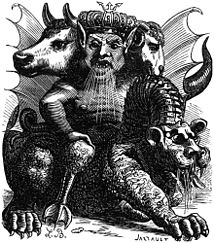
Classic depiction of Asmodeus
So far, the above two tenuously link rather straight forward-seeming game actions to demons’ descriptions. However, some allowed for more unusual and creative abilities.
Shax steals money and returns it in 1200 years, so naturally, he could steal a card from a player and keep it until later in the game when he would return it. What use is that? A demon merely presents the sorcerer with opportunity, it is the sorcerer’s own ingenuity that gives this opportunity purpose.
Buné “changes the places of the dead, causes demons to crowd round sepulchres” so his ability lets him cast demons upon other players without the normal restrictions and you exchange him with a demon from the discard pile instead of on the table after using his ability.
Valefor “leads those with whom he is familiar into theft – he shows friendship till they are caught in the trap”. In the game, the player can use Valefor’s ability every turn to draw from other players’ hands or from enticements on the table, but must turn over a card at the end of their turn. If it is a demon, the trap has been sprung!
And, of course, Asmodeus “indicates the places of concealed treasures, and guards them”, so what better demon to act as a Secret?
Of course, not every demon had such descriptions that inspired actions, so there are other demonic powers in the game that have their actions simply because I thought it would be cool. I understand it’s something that game designers do these days, so I didn’t want to be considered old fashioned by putting uncool stuff in my game.
In time for Indiecon a couple of weeks later, I had the revised Demon cards printed and ready to playtest with their abilities and quickly found I needed to define some timing rules in a game with Andrew Peregrine and Sarah Newton. At Conception, I was pleasantly surprised at some of the imaginative combos players were finding and got to show it around a fair bit amongst people I knew.
At this point, I still had it in my mind that the art would be reminiscent of their classic mediaeval depictions, but then Angus suggested I take a look at the work of George Cotronis. I liked it, though it jarred with the mediaeval image I’d built up in my head. I wrote up a brief for Asmodeus to see what he would do with it and what he returned convinced me that what we had was the chance to get something really cool on the market that really didn’t look like anything else. Again, I understand that this is something that cool game designers think is cool. (Or whatever those crazy kids are saying nowadays.)
After I wrote up a brief of all the cards in the game, he asked how much freedom he had to reinterpret them, for instance, in terms of their gender. Naturally, there’s absolutely no reason in my mind why a demon should be bound by gender – and it makes for a far more visually interesting game. Again, I understand it’s one of those cool things contemporary game designers are, to coin an expression, “all over”.
Seeing the game’s art finally realised, I got quite excited about showing people what was in store. I’d carry a bunch of representative art on my phone to show people whenever I spoke of the game. For UK Games Expo, I had some of the art printed out as teasers for the forthcoming game, which, with the art coming in and the rest of the game done, I had hoped would not be far behind completion.
Unfortunately, circumstance prevented me from getting to the layout for some time and a lot of fiddling around to get the right approach also delayed matters. Eventually, I had everything laid out, but postponements in commencing production made me dangerously feel as though this game might be doomed to be stuck in pre-production hell!
When Angus left Cubicle 7 in 2011 to start up his new company, Chronicle City, he took the rights for the art he’d paid for with him. Since the conception of my little card game, I’d since started developing a second game, got married to the very talented Linda (a.k.a. SheBlackDragon), had become a father and was collaborating on nearly a half dozen more game ideas. It was time for the world to see Faustus!
After some searching about, I stumbled upon The Game Crafter and put together a (not entirely cheap with shipping from the US) prototype which arrived just days before going to Birmingham for UK Games Expo once more. I used The Game Crafter partly because it was a good way to get a single preview prototype copy of the game printed and because they printed tarot-sized cards, which was the bigger challenge.
I spent pretty much the entire time demoing and letting people know that we’re aiming for an October release (in time for both Essen and Halloween). Everyone that played it gave positive feedback and indicated a desire to obtain a copy.
No words can describe the satisfaction of a delayed project finally manifesting. Holding the preview copy in my hands finally made the game feel real. Setting ourselves the goal of a release date also made things finally feel real.
Words cannot describe my excitement and apprehension at this game finally entering the final furlong. Excitement, of course, because it will be my first games design credit and apprehension, as with any games designer, I’m sure, that the game will be well received.
I already have some ideas for expansions (you read it here first!), but right now I have some newer games to develop. I understand it’s the “done thing” for games designers these days. It’s cool.

